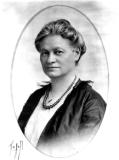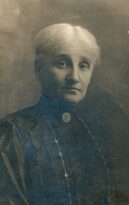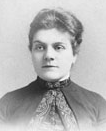Jewish women first organized themselves on a national scale at the end of the 19th century. The pioneer organization was the National Council of Jewish Women in America (NCJW), which was followed by many others around the world. From the beginning of the twentieth century, some of these local Jewish women’s organizations tried to establish activities on an international level, modelling themselves on the International Council of Women (ICW).

In 1899, NCJW President Hanna G. Solomon encouraged the creation of the Union of Jewish Women of England, and in Berlin in 1904 she helped create the German Jewish women’s organization, Judischer Frauenbund. Speaking that year in St. Louis, Solomon expressed the importance of an international bond among Jewish women: “And so we need internationalism for Jewish women, that shall bring them together to utilize their strength in perpetuating the great moral truths we hold for the world.…”

The official founding of ICJW is dated to 1912 when, at a meeting held in Rome, the leaders of Jewish women’s organizations from the United States, Britain, and Germany, voted to establish a worldwide organization of Jewish women, with Bertha Pappenheim from Germany as its first president.
At first the international organization of Jewish women remained theoretical. The opportunity to become a truly international Jewish sisterhood occurred only in 1920, when NCJW sent delegates to Europe to study the problems of European Jewry in the aftermath of World War I, and to explore ways of assisting them.

Two World Congresses of Jewish Women were held in Vienna in 1923, and in Hamburg in 1929, in order to renew international ties with European Jewish women, suspended during the war. These meetings were initiated and financed largely by NCJW of America, which sent large delegations, and were chaired by Rebekah Kohut.
The first Congress in Vienna, in May 1923, brought together delegates from Jewish women’s organizations from over 20 countries. The five main topics discussed were: the duties of the Jewish woman within the community; the problem of refugees and orphans; the situation of homeless girls; aid for emigration; and support for Palestine. Relocation to Palestine was recognized as a humanitarian solution and a way of providing sanctuary for European refugees.
The second World Congress of Jewish Women, in 1929, in Hamburg, Germany, demonstrated Jewish women’s solidarity on an international scale. 200 representatives from 14 countries came together to discuss subjects of common interest and to form a world organization of Jewish women. These meetings enabled Jewish women to meet and exchange views on important issues and to participate in determining the destiny of the Jewish people. They were recognized by Jewish communal leaders and by leading Jewish institutions. However, World War II prevented this success from being converted into practical implementation, and the activities of Jewish women’s organizations were not renewed until after World War II.
The Post-War Period
Immediately after World War II, the National Council of Jewish Women decided to revive its overseas program and to participate in the rescue actions of the Joint Distribution Committee. At their 1946 Convention, they agreed to re-establish the international Jewish women’s organization, which had been effectively dormant for nearly twenty years. Some of the European activists had disappeared, and others had resigned from public life, but the International Council’s last president, Rebekah Kohut, was still alive. For the sake of continuity, she was asked to head the organization. After two years of preparation, an international meeting was held in May 1949, in Paris, at which ICJW was endowed with some of its basic structures and its principles were defined. Many of those apply to this day.
The International Council of Jewish Women was defined as a federation of national women’s organizations, independent of each other, and apolitical in nature. Its objects were essentially: “To promote friendly relations and understanding among Jewish women of all countries; to further the best and highest interests of humanity; to uphold and strengthen the bonds between Jewish communities throughout the world; to support the principles of the United Nations Bill of Human Rights; and to improve the status of women.”
Based on ‘Jewish Women in a Changing World, A History of the International Council of Jewish Women, 1899-1995′, by Dr. Nelly Las – see her updated JWA Encyclopedia entry here.
The historical archives of ICJW are kept at the Central Archives for the History of the Jewish People in Jerusalem, and the searchable catalog of our archive can be accessed online here.
Past Presidents of ICJW
| Date | President | Country | Convention |
|---|---|---|---|
| 1859-1936 | Bertha Pappenheim | Germany | Established worldwide organization of Jewish Women, Rome – 1912 |
| 1949-1951 | Milded Welt | USA | Reconstitution Meeting, Paris, France – 1949 |
| 1951-1954 | Gladys Kahn | USA | 2nd Convention, New York, USA – 1951 |
| 1954-1957 | Pearl Willen | USA | 3rd Convention, London, United Kingdom – 1954 |
| 1957-1960 | Antonia Robinson | USA | 4th Convention, Jerusalem, Israel – 1957 |
| 1960-1963 | Antonia Robinson | USA | 5th Convention, Basel, Switzerland – 1960 |
| 1963-1966 | Frances Rubens | United Kingdom | 6th Convention, Cleveland, USA – 1963 |
| 1966-1969 | Isabelle Brown | USA | 7th Convention, London, United Kingdom – 1966 |
| 1969-1972 | Shoshana Hareli | Israel | 8th Convention, Jerusalem, Israel – 1969 |
| 1972-1975 | Rosa de Herzceg | Argentina | 9th Convention, Toronto, Canada – 1972 |
| 1975-1978 | Rosa de Herzceg | Argentina | 10th Convention, Melbourne, Australia – 1975 |
| 1978-1981 | Eleanor Marvin | USA | 11th Convention, Atlanta, USA – 1978 |
| 1981-1984 | Marice Halper-Rubinstein | USA | 12th Convention, Jerusalem, Israel – 1981 |
| 1984-1987 | Leila Seigal | Switzerland | 13th Convention, Bournemouth, United Kingdom – 1984 |
| 1987-1990 | Stella Rozan | France | 14th Convention, Vancouver, Canada – 1987 |
| 1990-1993 | Helen Marr | Canada | 15th Convention, Jerusalem, Israel – 1990 |
| 1993-1996 | Helen Marr | Canada | 16th Convention, Johannesburg, South Africa – 1993 |
| 1996-1999 | June Jacobs | United Kingdom | 17th Convention, Paris, France – 1996 |
| 1999-2002 | June Jacobs | United Kingdom | 18th Convention, Jerusalem, Israel – 1999 |
| 2002-2006 | Sara Winkowski | Uruguay | 19th Convention, Sydney, Australia – 2002 |
| 2006-2010 | Leah Aharonov | Israel | 20th Convention, Monte Video, Uruguay – 2006 |
| 2010-2014 | Sharon Gustafson | USA | 21st Convention, Cape Town, South Africa – 2010 |
| 2014-2018 | Robyn Lenn | Australia | 22nd Convention, Prague, Czech Republic – 2014 |
| 2018-2022 | Penelope Conway | United Kingdom | 23rd Convention, Sydney, Australia – 2018 |
| 2022- | Lilian Grinberg | Mexico | 24th Convention, Jerusalem, Israel – 2022 |